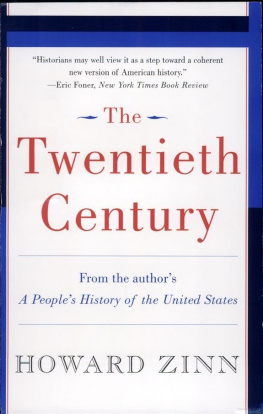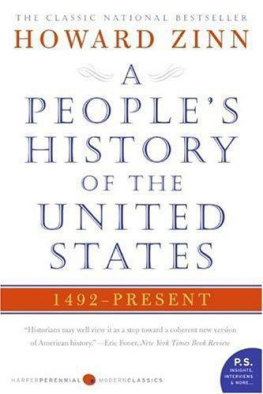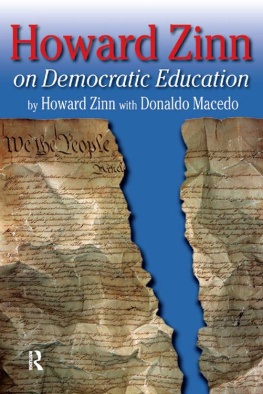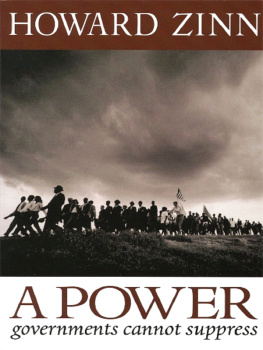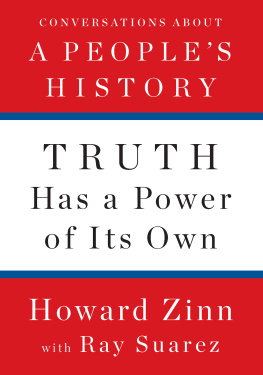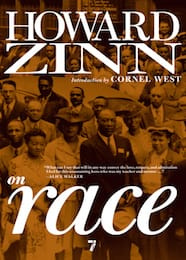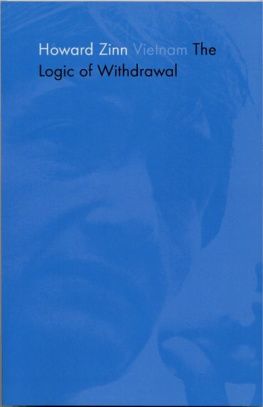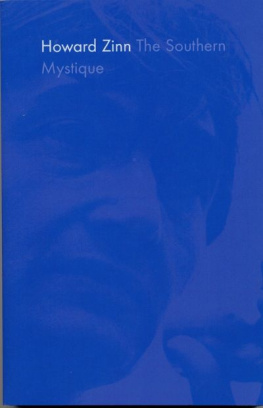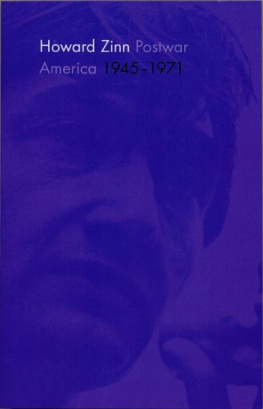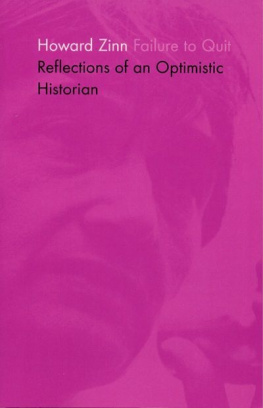THE INDISPENSABLE ZINN
ALSO BY HOWARD ZINN
La Guardia in Congress (1959)
SNCC: The New Abolitionists (1964)
The Southern Mystique (1964)
New Deal Thought (editor, 1966)
Vietnam: The Logic of Withdrawal (1967)
Disobedience and Democracy: Nine Fallacies of
Law and Order (1968)
The Politics of History (1970)
The Pentagon Papers: Critical Essays (co-edited with
Noam Chomsky, 1972)
Postwar America, 19451971 (1973)
Justice in Everyday Life: The Way It Really Works (editor, 1974)
A Peoples History of the United States, 14921980 (1980)
Declarations of Independence: Cross-Examining American
Ideology (1990)
Failure to Quit: Reflections of an Optimistic Historian (1993)
You Cant Be Neutral on a Moving Train: A Personal History of
Our Times (1994)
A Peoples History of the United States: The Wall Charts
(with George Kirschner, 1995)
A Peoples History of the United States: Abridged Teaching
Edition (1997)
The Zinn Reader: Writings on Disobedience and Democracy (1997)
The Future of History: Interviews with David Barsamian (1999)
Marx in Soho: A Play on History (1999)
Howard Zinn on History (2001)
Howard Zinn on War (2001)
Three Strikes: Miners, Musicians, Salesgirls, and
the Fighting Spirit of Labors Last Century (with Dana Frank
and Robin D.G. Kelley, 2001)
Emma (2002)
Terrorism and War (with Anthony Arnove, 2002)
Artists in Times of War (2003)
Passionate Declarations: Essays on War and Justice (2003)
A Peoples History of the U.S.: 1942 to the Present (2003)
A Peoples History of the United States: Abridged Teaching
Edition (2003)
A Peoples History of the United States, Volume I: American
Beginnings to Reconstruction (2003)
A Peoples History of the United States, Volume II: The Civil War
to the Present (2003)
The Twentieth Century: A Peoples History (2003)
The People Speak: American Voices, Some Famous, Some Little
Known (2004)
Voices of a Peoples History of the United States (co-edited with
Anthony Arnove, 2004)
A Just War (with Moises Saman and Gino Strada, 2006)
Original Zinn: Conversations on History and Politics (with David
Barsamian, 2006)
A Power Governments Cannot Suppress (with Donald
Macedo, 2007)
Howard Zinn on Democratic Education (2008)
Uncommon Sense from the Writings of Howard Zinn
(selected and introduced by Dean Birkenkamp and Wanda
Rhudy, 2009)
The Unraveling of the Bush Presidency (2009)
A Young Peoples History of the United States: Columbus to the War
on Terror (with Rebecca Stefoff, 2009)
The Bomb (2010)
Three Plays: The Political Theater of Howard Zinn (2010)
The Indispensable Zinn
The Essential Writings
of the Peoples Historian
HOWARD ZINN
Edited by
Timothy Patrick McCarthy

Compilation 2012 by The New Press
All rights reserved.
No part of this book may be reproduced, in any form,
without written permission from the publisher.
Requests for permission to reproduce selections from this book should be mailed to:
Permissions Department, The New Press, 38 Greene Street,
New York, NY 10013.
Pages 37779 constitute an extension of this copyright page.
Published in the United States by The New Press, New York, 2012
Distributed by Perseus Distribution
LIBRARY OF CONGRESS CATALOGING-IN-PUBLICATION DATA
Zinn, Howard, 19222010.
The indispensable Zinn: the essential writings of the peoples historian /
Howard Zinn ; edited by Timothy Patrick McCarthy.
p. cm.
Includes bibliographical references.
ISBN 978-1-59558-693-3 1. United StatesHistory.
2. United StatesPolitics and government. 3. United StatesSocial conditons.
4. Social movementsUnited StatesHistory. 5. Zinn, Howard, 19222010.
I. McCarthy, Timothy Patrick. II. Title.
E178.6.Z555 2012
973dc23
2011052775
Now in its twentieth year, The New Press publishes books that promote and enrich public discussion and understanding of the issues vital to our democracy and to a more equitable world. These books are made possible by the enthusiasm of our readers; the support of a committed group of donors, large and small; the collaboration of our many partners in the independent media and the not-for-profit sector; booksellers, who often hand-sell New Press books; librarians; and above all by our authors.
www.thenewpress.com
Composition by Westchester Book Composition
This book was set in Fournier
10 9 8 7 6 5 4 3 2 1
This book is dedicated to the memory of
HOWARD ZINN (19222010) and
MANNING MARABLE (19502011)
and to all those who speak truth to power
CONTENTS
Noam Chomsky
It is not easy for me to write a few words about Howard Zinn, the great American activist and historian who passed away a few days ago. He was a very close friend for forty-five years. The families were very close too. His wife Roz, who died of cancer not long before, was also a marvelous person and close friend. Also somber is the realization that a whole generation seems to be disappearing, including several other old friends: Edward Said, Eqbal Ahmed, and others, who were not only astute and productive scholars but also dedicated and courageous militants, always on call when neededwhich was constant. A combination that is essential if there is to be hope of decent survival.
Howards remarkable life and work are summarized best in his own words. His primary concern, he explained, was the countless small actions of unknown people that lie at the roots of those great moments that enter the historical recorda record that will be profoundly misleading, and seriously disempowering, if it is torn from these roots as it passes through the filters of doctrine and dogma. His life was always closely intertwined with his writings and innumerable talks and interviews. It was devoted, selflessly, to empowerment of the unknown people who brought about great moments. That was true when he was an industrial worker and labor activist, and from the days, fifty years ago, when he was teaching at Spelman College in Atlanta, Georgia, a black college that was open mostly to the small black elite.
Originally appeared in Resist Newsletter, March/April 2010.
While teaching at Spelman, Howard supported the students who were at the cutting edge of the Civil Rights Movement in its early and most dangerous days, many of whom became quite well known in later yearsAlice Walker, Julian Bond, and othersand who loved and revered him, as did everyone who knew him well. And, as always, he did not just support them, which was rare enough, but also participated directly with them in their most hazardous effortsno easy undertaking at that time, before there was any organized popular movement and in the face of government hostility that lasted for some years. Finally, popular support was ignited, in large part by the courageous actions of the young people who were sitting in at lunch counters, riding freedom buses, organizing demonstrations, facing bitter racism and brutality, sometimes death. By the early 1960s a mass popular movement was taking shape, by then with Martin Luther King Jr. in a leadership role, and the government had to respond. As a reward for his courage and honesty, Howard was soon expelled from the college where he taught. A few years later he wrote the standard work on SNCC (the Student Nonviolent Coordinating Committee), the major organization of those unknown people whose countless small actions played such an important part in creating the groundswell that enabled King to gain significant influence, as I am sure he would have been the first to say, and to bring the country to honor the constitutional amendments of a century earlier that had theoretically granted elementary civil rights to former slavesat least to do so partially; no need to stress that there remains a long way to go.
Next page

